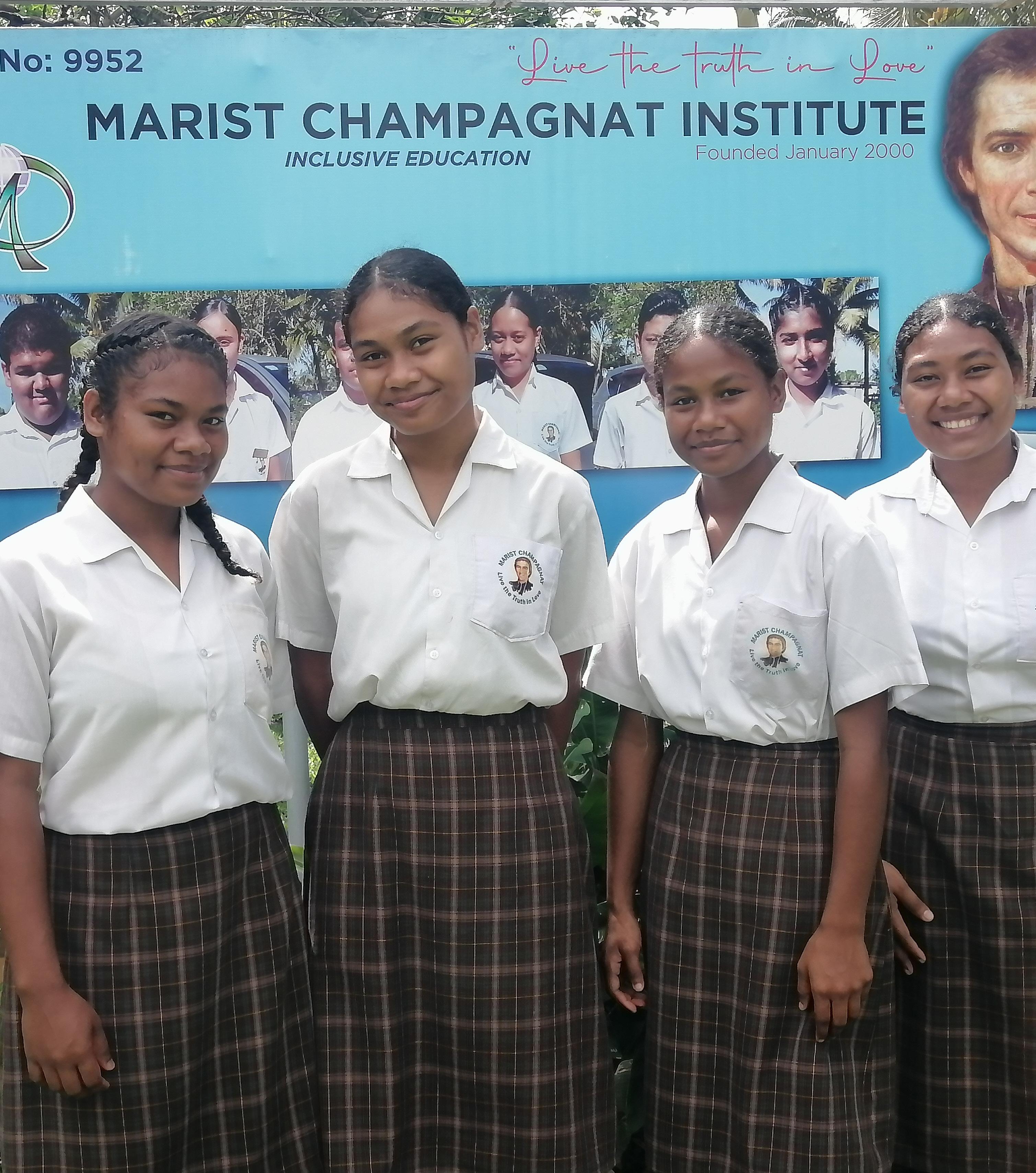






Australian Marist Solidarity (AMS) believes in a world where young people have hope and the opportunity to access education. Our mission is to partner with communities in the Asia Pacific region to facilitate access to education for young people in need.
We believe local people are the experts on the challenges facing their communities and the solutions that will address these challenges. By working directly with community partners, we help them access the resources required to deliver quality education and serve young people where and how they need it most. To help us focus our efforts to ensure their young people reach their brightest potential, AMS partners with local communities in three key areas of work:
Access to education
We facilitate access to quality education for vulnerable children and young people through projects in primary, secondary, vocational and tertiary education programs across Asia and the Pacific.
Facilities for the future
We invest in infrastructure to ensure safe places for learning.
Resilience and readiness
We support programs to build resilience, provide care, and empower marginalised communities to strengthen access to education and workplace skills and knowledge.
Together, we bring hope.
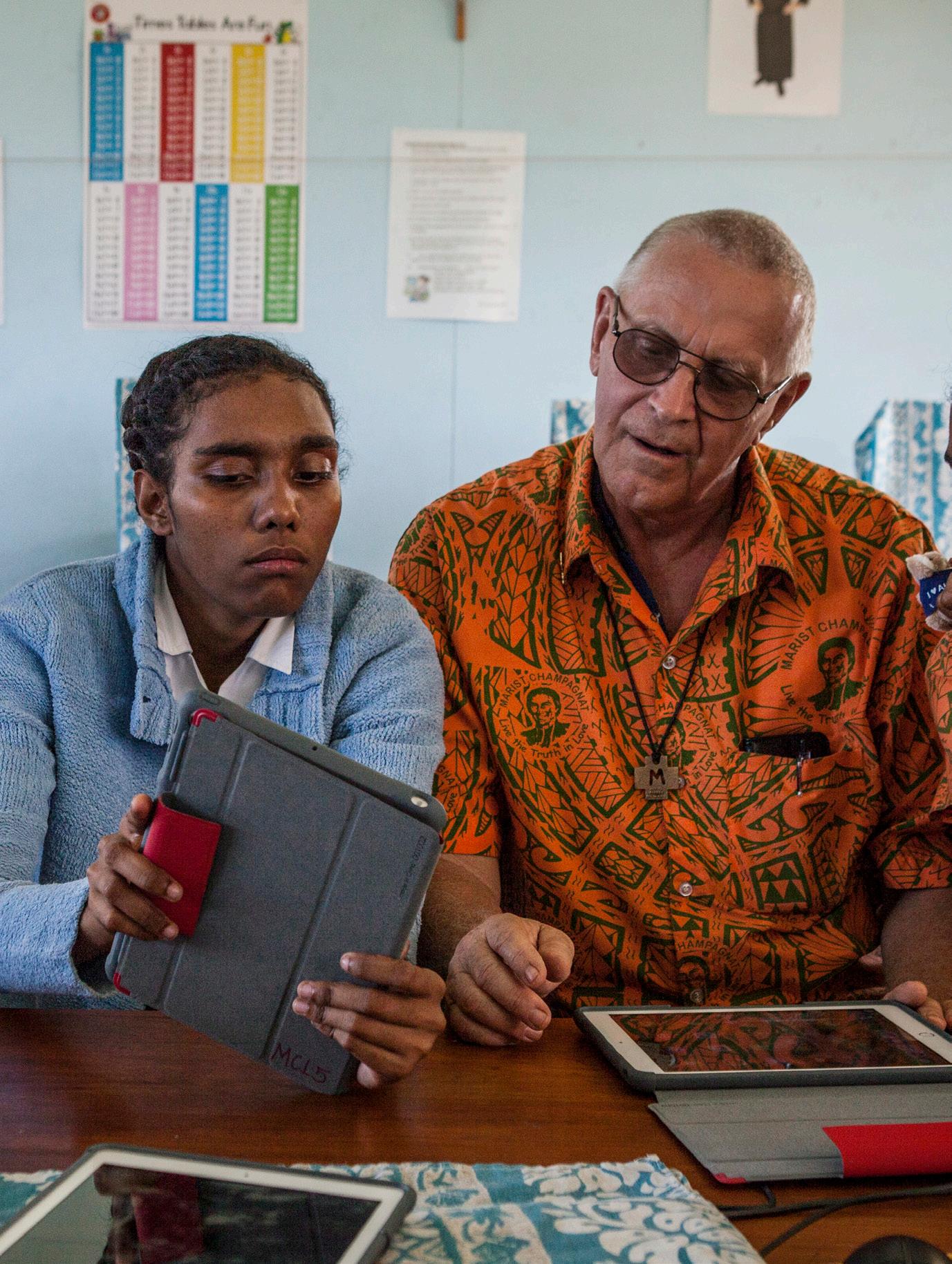
Dear Friends,
Welcome to our summer issue of Solidarity Matters 2025.
As the year draws to a close, let us reflect on 2024 and the young people AMS has been able to support. It has undoubtedly been another busy year for AMS, presented with some challenges but also many triumphs.
I personally would like to take this opportunity to thank all our AMS friends for your ongoing support and enthusiasm in our work. I would also like to thank our Program Partners, who, because of your dedication, AMS can continue raising awareness and carry out the work we do. I would also like to thank our Marist Schools for their extraordinary fundraising efforts and for continuing to show interest in AMS.
This year, AMS has worked in 18 countries, serving 54 programs with 40 partners, supporting more than 8000 people who would otherwise go without the essential care and education they need.
You can read program updates on page 12 of this edition, highlighting the completion of a “Family and Youth Centre” in Solomon Islands under the Catholic Archdiocese of Honiara or the progress report of a two-story administration building for St Louis High School, Kiribati. We are excited to share our
program updates with you all.
Since our Adelaide Community Gathering which took place in August, we have held our Brisbane, Sydney and Melbourne Community Gatherings in November. It was wonderful to have Br Kees van der Weert with us from Fiji, to shed light on the fantastic work taking place at Marist Champagnat Institute (MCI) Fiji, which is featured on page 4. You will read in the following pages that this edition of Solidarity Matters pays a special tribute to MCI and Fiji.
I am also pleased to announce the appointment of interim CEO, Richard Quinn, who will take on the role of Acting CEO of AMS (part-time) until a permanent appointment is made for the new role of Director of Solidarity. I will be providing on-going assistance in an executive strategy support capacity from England until then.
On behalf of myself and the AMS Team, we wish you a Merry Christmas or as they say in Fijian, “Vakanuinui vinaka ena sigsnisucu” and a Happy New Year. Until next year,
Yours in Solidarity,

Anna Mosbauer Acting CEO
Charlotte is the Fundraising Coordinator at AMS, bringing experience in operations, fundraising, and building sponsor relationships, particularly in the education sector. She’s organised events that directly support educational improvements. Previously, Charlotte worked in client engagement and product management in aviation and travel, where she honed her skills in communication, relationship building, and project management.
Passionate about education and community impact, she thrives in roles that drive positive change. In her free time, Charlotte enjoys spending weekends with her family, playing sports, being outdoors, and traveling. She’s always up for supporting causes that make a difference.

Read previous editions of Solidarity Matters on our website.
GOT A STORY?
We’d love to share it with our supporters!
Please send it to:
AMS@marists.org.au
COVER IMAGE
Sisters Marie Rosa, Luisa, Elisabeta and Filomena; students from Marist Champagnat Institute (MCI), Fiji and the focus of our 2024 AMS Christmas Appeal.

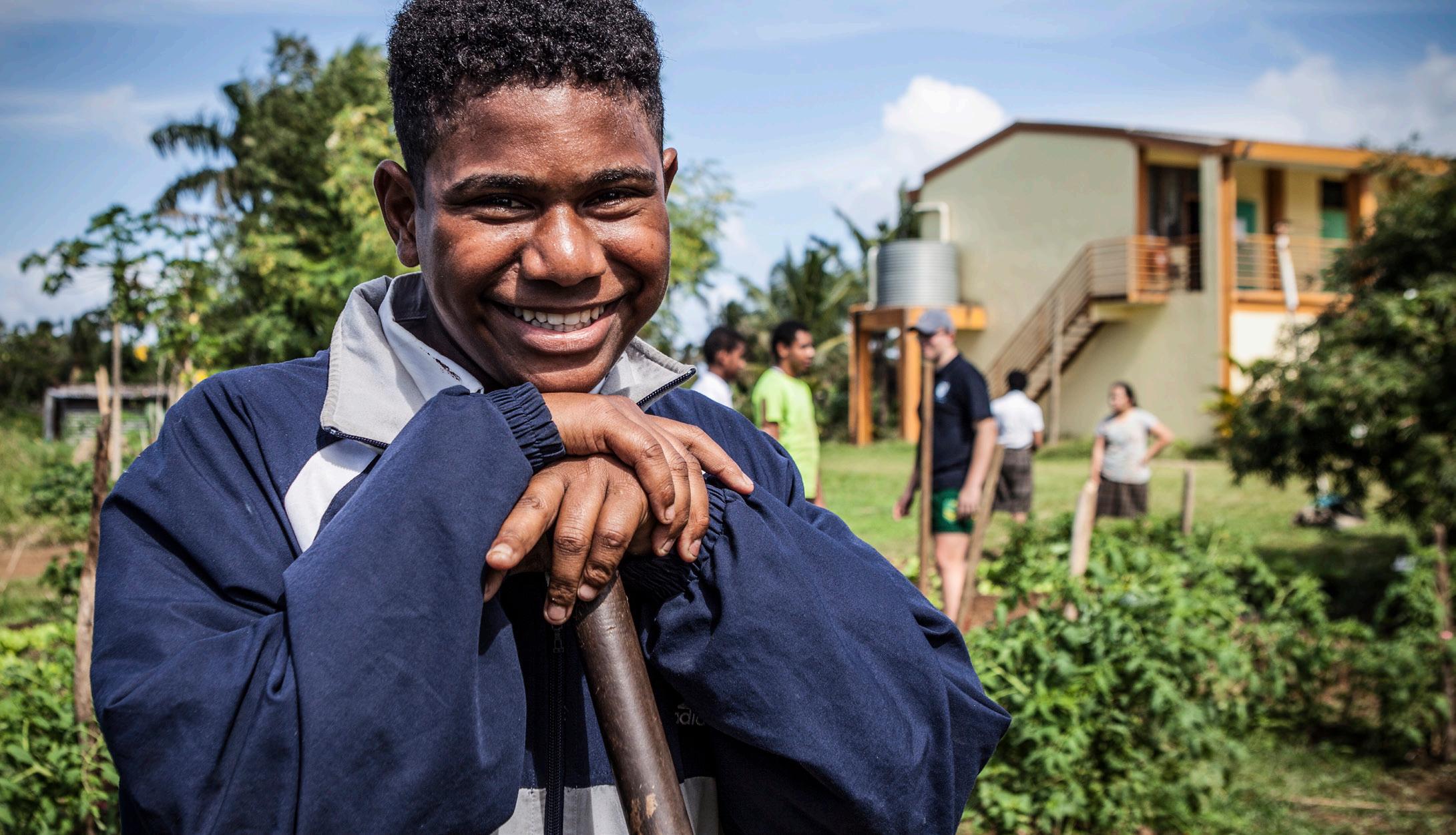
This year, we were fortunate to welcome Brother Kees van der Weert from Marist Champagnat Institute (MCI), Fiji, as a special guest at our AMS Community Gatherings in Adelaide, Brisbane, Sydney, and Melbourne. During his talks, Brother Kees eloquently shared the profound impact MCI is having on young lives in Fiji, particularly through its inclusive education for students with physical or learning disabilities. He also provided an inspiring glimpse into the future of MCI, with the development of a new wing of classrooms to accommodate the burgeoning student population.
We would like to thank all our supporters for their attendance and keen interest in our programs and partners here at AMS. It was certainly a highlight for the AMS Team to witness the “Kava Ceremony” in Brisbane, received by Br Kees thanks to the Fijian Old Boys Association, organised by Acting Board Chair, Norman Chan.

The AMS Community Gatherings not only provide an opportunity for AMS to spotlight a program partner and raise awareness, but also to gather our Marist Community in solidarity and appreciate the work that is being carried out abroad by our dedicated partners who continue to transform young lives.
The AMS Community Gatherings not only provide an opportunity for AMS to spotlight a program partner and raise awareness, but also to gather our Marist Community in solidarity and appreciate the work that is being carried out abroad by our dedicated partners who continue to transform young lives.
As these events and our 2024 Christmas Appeal centre on MCI, we thought to further highlight the great work MCI is carrying out in Fiji as a special editorial spotlight.


Marist Champagnat Institute (MCI), located in Vatuwaqa, Fiji, is the only school in the country dedicated exclusively to supporting young people with learning difficulties. Since its founding in 2000, the school has steadily grown, now providing inclusive education to over 130 students.
Under the dedicated leadership of Brother Kees van der Weert and his team of committed teachers, MCI continues to empower students by equipping them with the skills, confidence, and knowledge they need to succeed in mainstream education, secure employment, and lead fulfilling lives.
The curriculum at MCI is designed to develop essential life skills, and includes subjects such as literacy, numeracy, woodwork, agriculture, computer studies, home economics, and more. These subjects are carefully chosen to help students build a strong foundation for their future, both personally and professionally.
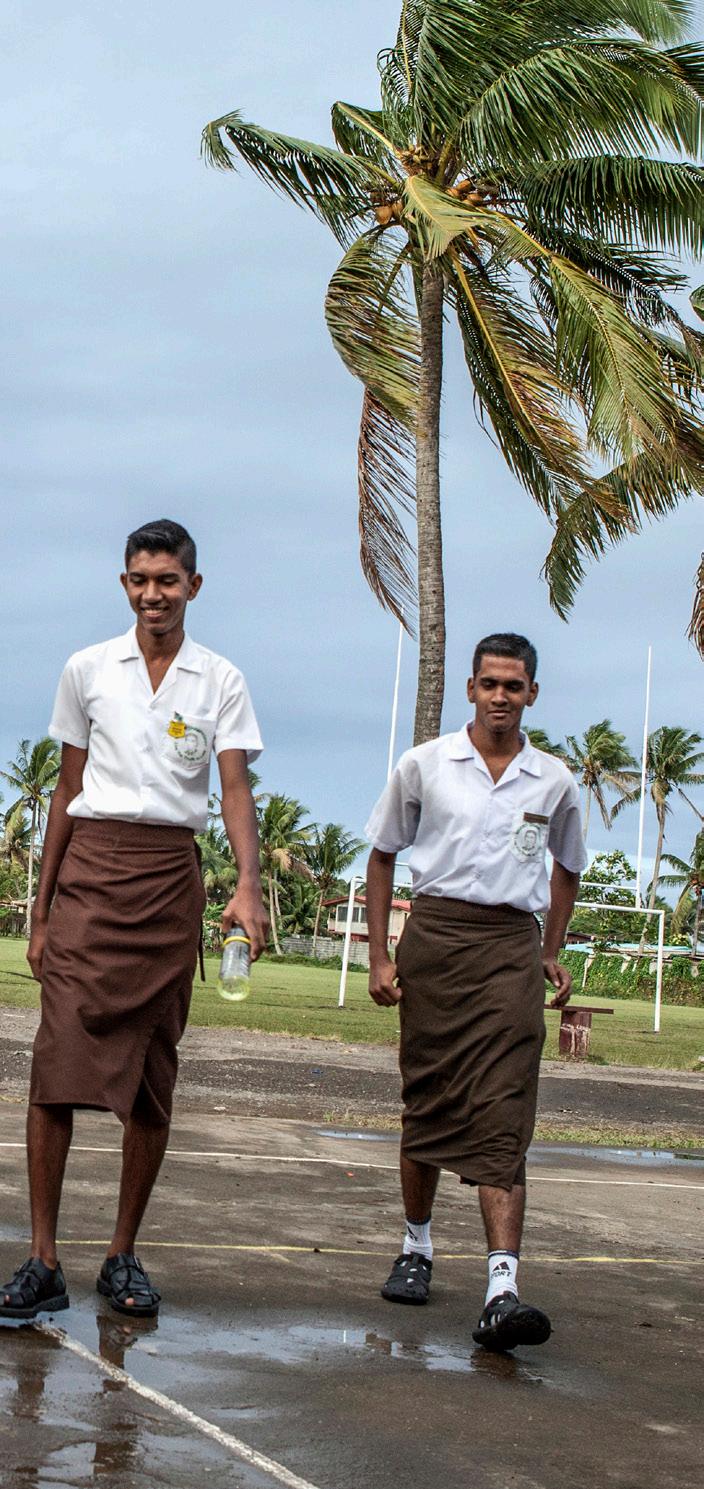
Pictured opposite: (top & bottom) Student of MCI tending to school grounds; (bottom) and undertaking Spiritual class.
Pictured this page: (top) Students cheering along with school immersion student from Australia; (bottom) Students of MCI casually strolling through school grounds.
Fiji is a tropical island nation located in the South Pacific Ocean, northeast of Australia, approximately 2,000 kilometres away. Comprising over 300 islands, with Viti Levu and Vanua Levu being the largest, Fiji offers a rich cultural heritage influenced by its indigenous Fijian and Indian populations, which total 950,000 and has a strong, robust economy. Suva, is the largest urban centre and the political and economic hub of the country.
However, despite reaching many of its development goals, youth not in employment, education or vocational training sits at over 40% of the population, with females making up a large part of this number.
Many of the barriers faced by young people accessing education or vocational training can be due to various reasons such as inability to afford tuition, remoteness and unreliable transportation, traditional family roles which sees young girls being expected to help with domestic work as well as the lack of inclusive schools to tailor to the needs of children with learning difficulties.
Without the potential of a large, young labour force, it is important for institutes like Marist Champagnat Institute to provide avenues for the future generation of Fiji and those thereafter.


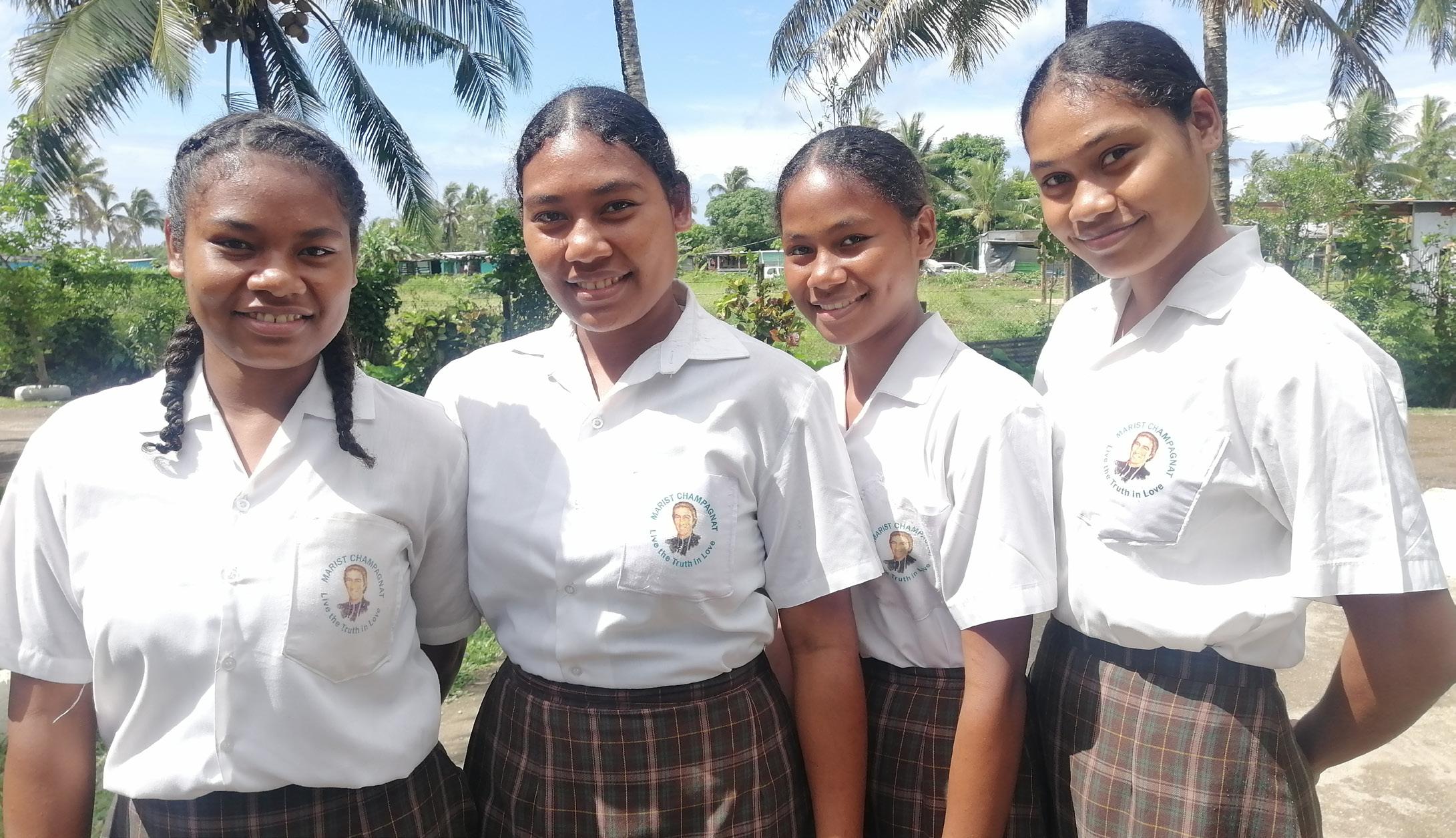
osa Marie, Filomena, Elisabeta and Luisa are four sisters who enrolled at MCI earlier this year. Aged 14-20, the girls had never previously attended school, due to the remoteness of their village, as well the hesitations and concerns from their parents. Instead, they were taught to tend to their ecosystem, helping their father on the farm with the cutting of copra, or maintain their dalo crops or fishing for their family and community.
While this is commendable, it only took a visit from their auntie who resided in Suva to encourage the girls to attend formal education. After many discussions with parents, all four sisters were given the “green light” to attend MCI, with the hope that learning would help them secure a better future for them and their family.
In January 2024, the sisters ere accessed as non-readers who had no prior knowledge of basic math. Despite the initial challenges and culture shock, they have come
to embrace their new school life. Rosa has seen her reading and math skills improve, while Filo has strengthened her English and math. Elisabeta enjoys woodwork, making a pot plant stand, and Luisa, who loves English and AFL, trains three times a week, dreaming of representing Fiji in sports.
Their mother, Kusitina, is deeply grateful to the Marist Brothers, MCI staff, and supporters like Australian Marist Solidarity. She had never heard of MCI before but now believes it’s the answer to her prayers for her daughters’
futures. She’s seen remarkable changes in their literacy, numeracy, confidence, and social skills. The family also appreciates the warm, supportive environment at MCI, which stands apart from other schools. Kusitina was especially moved by the staff’s care for students with special needs during the school’s 25th silver jubilee celebration.
Thanks to MCI, the girls now have the opportunity to build a brighter future, and their mother is filled with hope and admiration for their progress.
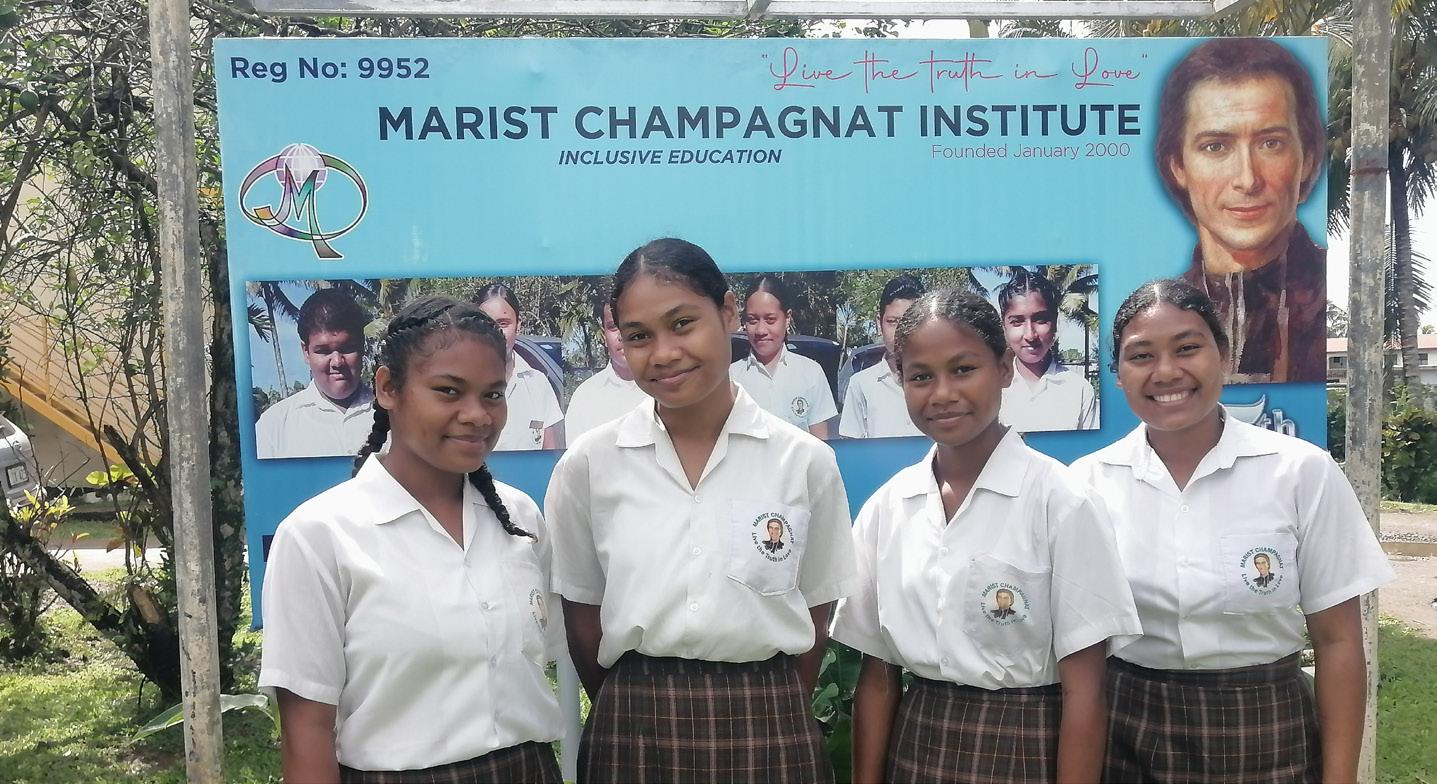
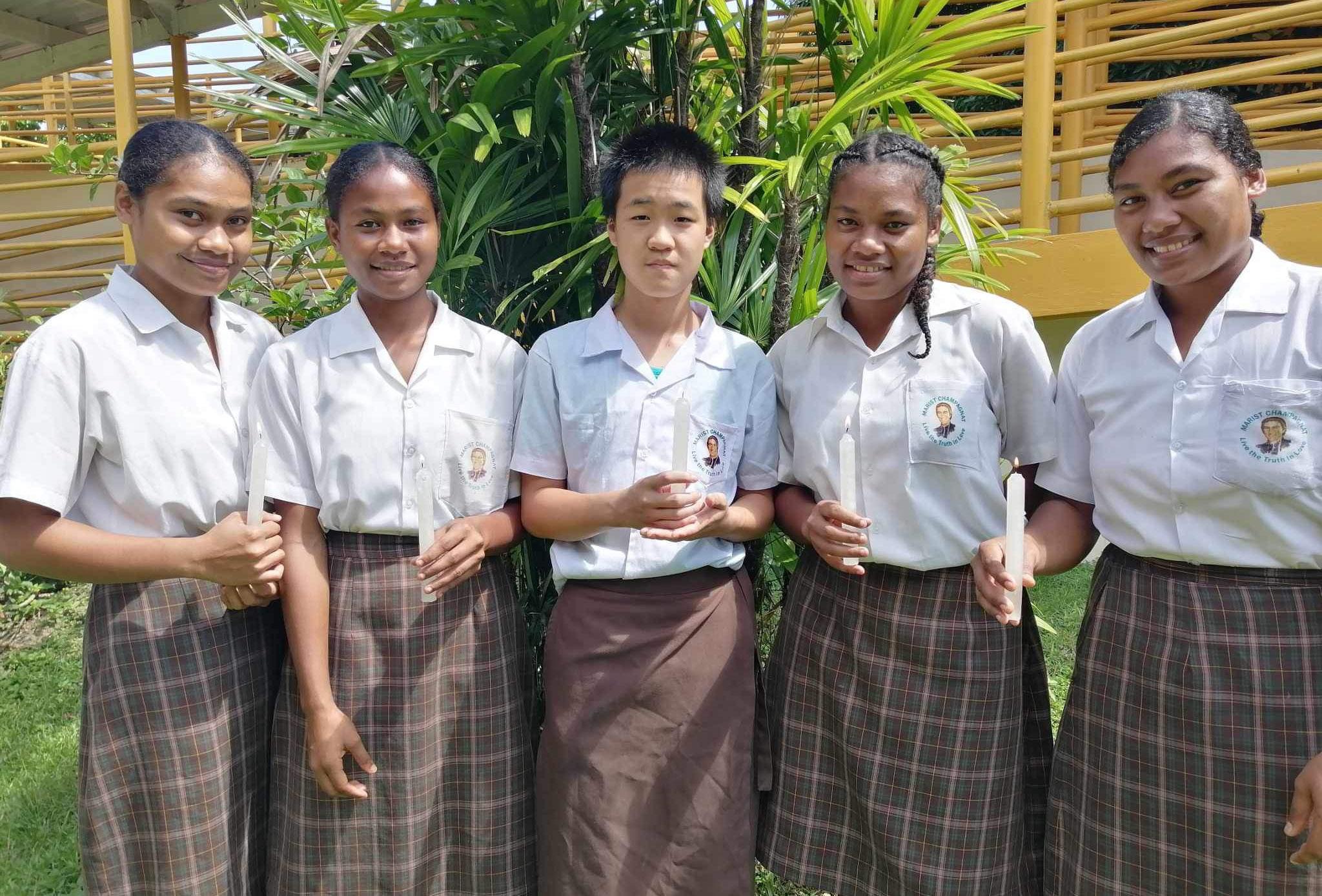
This is just one of many stories from students at MCI, each with their own unique journey to the school. For all of them, the opportunity to receive a formal education is not only transforming their lives but also equipping them with the means to contribute meaningfully to their communities.
Elisabeta (pictured right) is one of 37 female students at Marist Champagnat Institute.
As a new teenage student, Elisabeta is attending school for the first time and is thoroughly enjoying her woodworking classes as well as developing a love of Maths. Elisabeta’s new skills are opening doors to future workforce opportunities.
Together, AMS aims to raise $40,000 to provide MCI with the school resources it needs to support students like Elisabeta to receive an inclusive education in Fiji.
If you have not already, please donate to the AMS Christmas appeal to support Elisabeta and her peers at MCI. You can donate via the link: https://bit.ly/41hqvau or find bank details on page 26.

Pictured opposite: (top) Sisters Luisa, Rosa Marie, Elisabeta and Filomena pose for a photograph (bottom) sisters standing proudly in front of school sign.
Pictured this page: (top) Sisters with ; (bottom) Elisabeta in pottery class making clay bowls to sell as a means to fundraise for MCI.
In Fiji, there are several factors related to traditional gender expectations that can make it more difficult for girls to access education. Many girls are expected to take on household responsibilities, such as cooking and caring for family members, which can limit the time and energy they dedicate to school.
Cultural practices, such as early marriage, also sometimes lead to girls leaving school earlier than their peers. Financial constraints can also play a role, with families sometimes prioritising boys’ education when resources are limited. In addition, issues like harassment, genderbased violence, and the stigma surrounding menstruation can make school environments less supportive for girls, leading them to miss classes or even drop out.
The lack of female role models in schools and the presence of gender stereotypes in both the curriculum and extracurricular activities can also discourage girls from pursuing certain subjects or activities. Girls may face additional barriers in rural areas, where school travel can be difficult.
Finally, community and religious expectations sometimes reinforce traditional views about gender, which can place pressure on girls to focus on family life rather than education.
Addressing these challenges requires a collective effort to create a more supportive and inclusive environment for girls, allowing them the opportunity to thrive in their education.

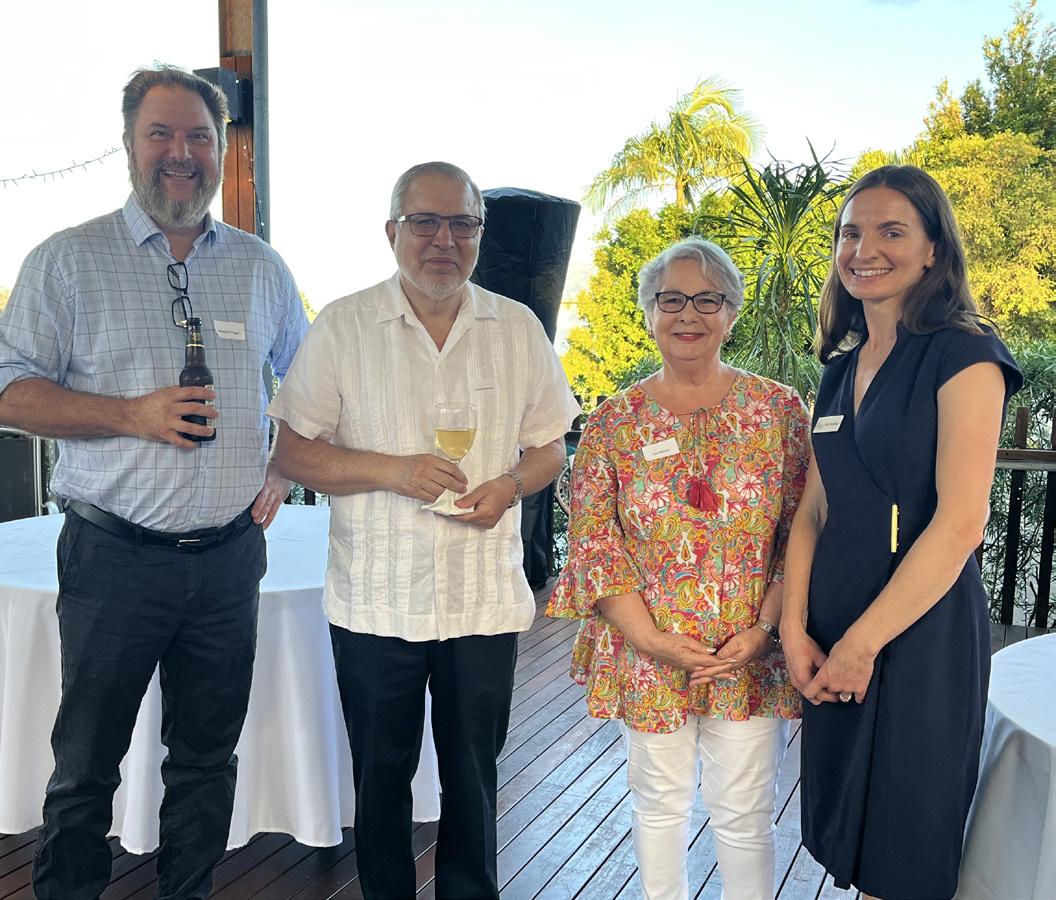







(top L-R) Anna, Committee Member Langton Clarke,Dan O’Sullivan; Br Kees receiving “Kava” as part of his welcome ceremony; Br Kees featured with members of the Marist Old Boys Association, Fiji in Sydney; (below L-R) Fundraising Coordinator Charlotte Myers, Michael Druce and Dr Kevin Treston; Melbourne gathers in Brunswick; Marist Old Boys Associa
tion, Fiji; Marist Old Boys Association Fiji in Adelaide; Br Kees with staff from Sacred Heart College, Adelaide.








With your support, AMS can help raise funds for students at Marist Champagnat Institute (MCI), providing them with second-chance education to pursue skills-training in areas such as woodwork, agriculture, computer sciences and catering.
Jone shyly stands in front of the camera in his pink shirt adorned with orchids, while his teacher, Ms. Kathy Foi, eagerly captures the moment. Jone is 17 years old and a student at Marist Champagnat Institute (MCI) in Fiji. Like many of his peers at MCI, Jone enjoys working with his hands, and he has developed a particular passion for gardening and agricultural studies.
This interest began at a young age when he would join his father in the garden, tending to their crops for subsistence farming.
Together, they worked under the sun, with Jone eagerly learning from his father an important life skill passed down through generations: the value of providing healthy, organic food for his family and community.

Jone brought this passion with him to his studies at Marist Champagnat Institute, where he now tends to the cabbage and lettuce crops. An avid cook, Jone enjoys making soup and stir-fry using the cabbage from the school garden. His ultimate dream is to contribute to a healthier Fiji, where nutrition is openly discussed to protect the nation from dietrelated illnesses.
To watch Jone’s interview, click the link or type the web address into your browser.
https://bit.ly/3Z0A8HN
This festive season, we are kindly asking for your help to “Share the light of Christmas” and give students like Jone, Elisabeta, Filomena, Rosa Marie and Luisa (pg.6) hope for their future as they embark on their education journey at Marist Champagnat Institute.
To donate, simply click the link or enter the link into your browser: https://bit.ly/41hqvau or find page AMS bank details on pg 26.

CAMBODIA YOUNG ADULT IMMERSION: REFLECTIONS ON A TRANSFORMATIVE JOURNEY WITH MARIST YOUTH MINISTRY
This December, ten young adults embarked on a transformative 10-day immersion across Cambodia, connecting with the heart of the nation and the incredible work of AMS partners, LaValla and Pailin. The journey began with a sobering visit to the Tuol Sleng Genocide Museum and the Killing Fields, offering deep insight into Cambodia’s painful past under the Khmer Rouge. Despite the scars of history, participants were inspired by the country’s resilience and vibrant culture, seen in its markets, temples, and communities rebuilding with hope.
The group visited the LaValla Project, which provides inclusive education and vocational training for children with physical disabilities. They witnessed how LaValla helps students overcome societal stigma and barriers, enabling them to pursue education and achieve their goals. Sharing a communal lunch with the LaValla community was a highlight, offering a meaningful opportunity to connect, share stories, and foster cross-cultural understanding.
In Pailin, participants spent time with the Marist Education Centre (MEC) and Marist Centre of Hope (MCH). MEC offers a range of classes to foster academic and personal growth, while MCH provides safe accommodations and support for rural youth pursuing secondary education. These programs help students overcome isolation and economic hardship, empowering them to succeed and uplift their communities. Each evening, participants gathered for reflection, sharing insights and learning from one another. The immersion concluded with a visit to the majestic Angkor Wat, where the group reflected on Cambodia’s rich history and enduring spirit. By the end of the trip, participants had experienced Cambodia not as tourists, but as pilgrims—deeply connected to the country’s history, culture, and resilience. This journey is a testament to the power of solidarity, understanding, and the transformative impact of cross-cultural immersion. See below images of Taylor Lemmon (AMS Programs Officer) and Marist Youth Ministry participants with children from our program partner schools.’



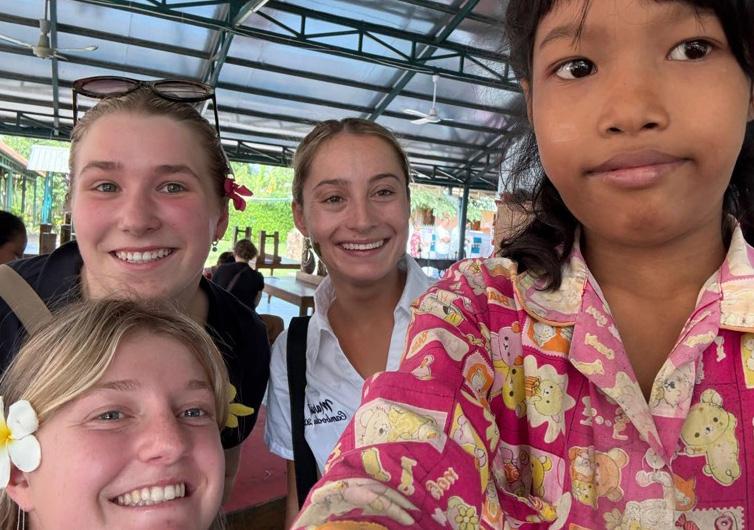


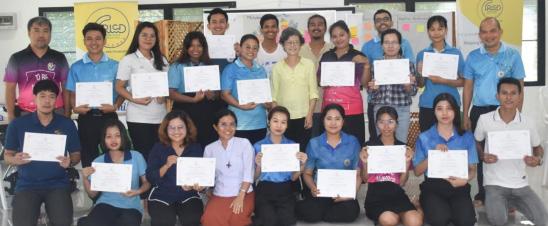
Operation Rainbow project) hosted an insightful one-day workshop on “Family Wellbeing” during the middle of the year, led by Fr. Antony Peter OFM Cap from Padony Counselling Centre, Trichy.
The event saw active participation from 54 families, who gained valuable insights into parent-child relationships, time management, child upbringing and the impact of parental behaviour on children. Coinciding with Women’s Day, the workshop featured a special cakecutting ceremony to celebrate the occasion.
Beneficiaries received monthly rations, medicines, and travel allowances, and a delicious lunch was provided to all 120 participants. The event was a resounding success, thanks to the dedicated

efforts of the Rainbow staff and Marcellin Club members.
Marist Asia Foundation (MAF) runs two main programs in Ranong: an education program and an HIV health program, both based at the Burmese Migrant Education Centre. The health program has its own administrative building.
These programs work together to remove barriers that prevent youth from completing their education and to support the health of Burmese migrant families.
By providing healthcare access, MAF helps ensure children can continue their education and families can live with dignity. The foundation also helps families obtain the necessary documentation to live legally in Thailand and access
essential services. MAF’s holistic approach highlights the link between health and education in breaking the cycle of poverty for migrant families.
Mid this year, the MAF Education Project launched the GED Program, which offers an alternative to a high school diploma. Instead of a traditional diploma, students can take a series of tests to prove they have a high school-level education. Passing the GED exam earns students a diploma and opens up better job opportunities.
The GED covers four main subjects: Math (Basic Math, Geometry, Algebra, Graphs), Language Arts (Reading, Writing, Grammar), Science (Experiments, Interpreting Data), and Social Studies (History, Analysing Data). To join, students must have at least an A2 to B1 level
of English. Classes run Monday to Friday afternoons, with each subject taking 6-8 weeks.
Furthermore, Two English teachers completed an online TEFL/TESOL course and earned a Certificate in Teaching English to Speakers of Other Languages.
The Marist Asia Foundation hosted a three-day Teacher Professional Development seminar earlier this year, at the Harmony Centre. The seminar, led by the Inclusive Education Foundation-Teacher FOCUS, covered topics like the LEGO Ideal School Activity, Child Safeguarding, School Leadership, and teacher reflection techniques.
The goal was to enhance the teaching skills of MAF volunteer teachers.
Thai Non-Formal Education teachers also attend regular training through the Thai NFE Department, with ongoing discussions on integrating the Myanmar language into the curriculum.
St Marcellin School, Giasnogor has long been a place of refuge
and educational opportunity for children from the marginalised tea garden community. Missionary Sisters at the school observed that family visits were often brief due to the lack of a dedicated space for families to gather. This issue was further confirmed by feedback from parents, who expressed a need for a comfortable place to spend quality time with their children, rather than having to sit on the ground or stand during their visits.
In response to these needs, AMS supported the construction of two shelters and the furnishing of a visitor’s room at the school. These new spaces have made a significant difference, providing a comfortable and welcoming environment for families to connect. As a result, students and their families now have a dedicated, cozy space to interact, strengthening the bonds between them.
St. Marcellin School serves children whose parents work in the tea gardens, a community that faces systemic poverty and harsh labour conditions. Tea garden workers often earn as little as $1 a day, enduring exploitation under poor labour laws. The school remains a

crucial resource for families seeking a future free of exploitation for their children in this challenging context.
St Louis High School, Kiribati
On the island of Tarawa, Kiribati, 1,117 students aged 13 to 19 attend St. Louis School. As rising sea levels continue to threaten this low-lying nation, providing highquality education to its youth has never been more urgent.
Recognising this need, it became clear that teachers at St. Louis required a dedicated space for planning, collaboration, and grading. Previously, no such space existed, but the construction of a two-story administration building is now underway to bridge this gap.
This new building will offer teachers a dedicated workspace, enhancing their productivity and teamwork. With all faculty members in one location, students will also find it easier to connect with their teachers when they need assistance. The building will further include a new computer lab and a senior student library, providing much-needed resources and additional space for both teachers and students.


library, providing much-needed resources and additional space for both teachers and students. So far, the Administration Building has installed window frames to the existing foundation of the building.
Solomon Islands
St. Mother Theresa Family and Youth Centre, nestled in the rural heart of Arulligo, West Guadalcanal, now stands the St. Mother Theresa Family and Youth Centre—a spacious event venue designed to host celebrations for the Catholic Archdiocese of Honiara.
Built in collaboration with local surrounding communities over four years, this centre will serve as a hub for large gatherings, including youth, women, and family activities, as well as events for church groups and both provincial and national government functions. In a country where space for such important community events is often limited, the centre is a true blessing for fostering development and unity.
As part of this joint venture, AMS co-financed the installation of a solar hybrid electrical system, ensuring the centre remains powered despite the unreliable grid electricity in this remote area. This sustainable solution offers
both light and energy for the centre, supporting its vital role in community life.
St Martin’s Rural Training Centre (RTC), St Martin’s Rural Training Centre (RTC) in Guadalcanal, Solomon Islands, plays a vital role in providing vocational training to youth, especially those who face barriers in completing formal education. It serves as one of only two vocational centres in the country, offering co-ed boarding facilities to students from outer provinces who may otherwise have limited educational opportunities.
The centre has recently completed its first staff housing project, addressing a long-standing issue. Since its establishment, the staff housing has been in dire need of renovations. The original housing units, located by the Tenaru River, have deteriorated significantly due to lack of maintenance, and their proximity to the river has led to additional damage from flash floods.
These floods not only worsened the living conditions but also posed a significant danger to the teachers’ safety. In response to these challenges, the staff housing is now being relocated inland, away from the flood-prone
area. This relocation is crucial in ensuring the safety of the teachers and providing more stable living conditions. Good staff housing is not only important for attracting and retaining quality teachers but also serves a functional role at RTC.
As the school currently lacks a dedicated teachers’ office, the new housing units will also double as offices for staff, enhancing both their work environment and the overall functioning of the school.
This development marks a significant step forward in improving the infrastructure and working conditions at RTC, contributing to the overall quality of education provided to students in the Solomon Islands.




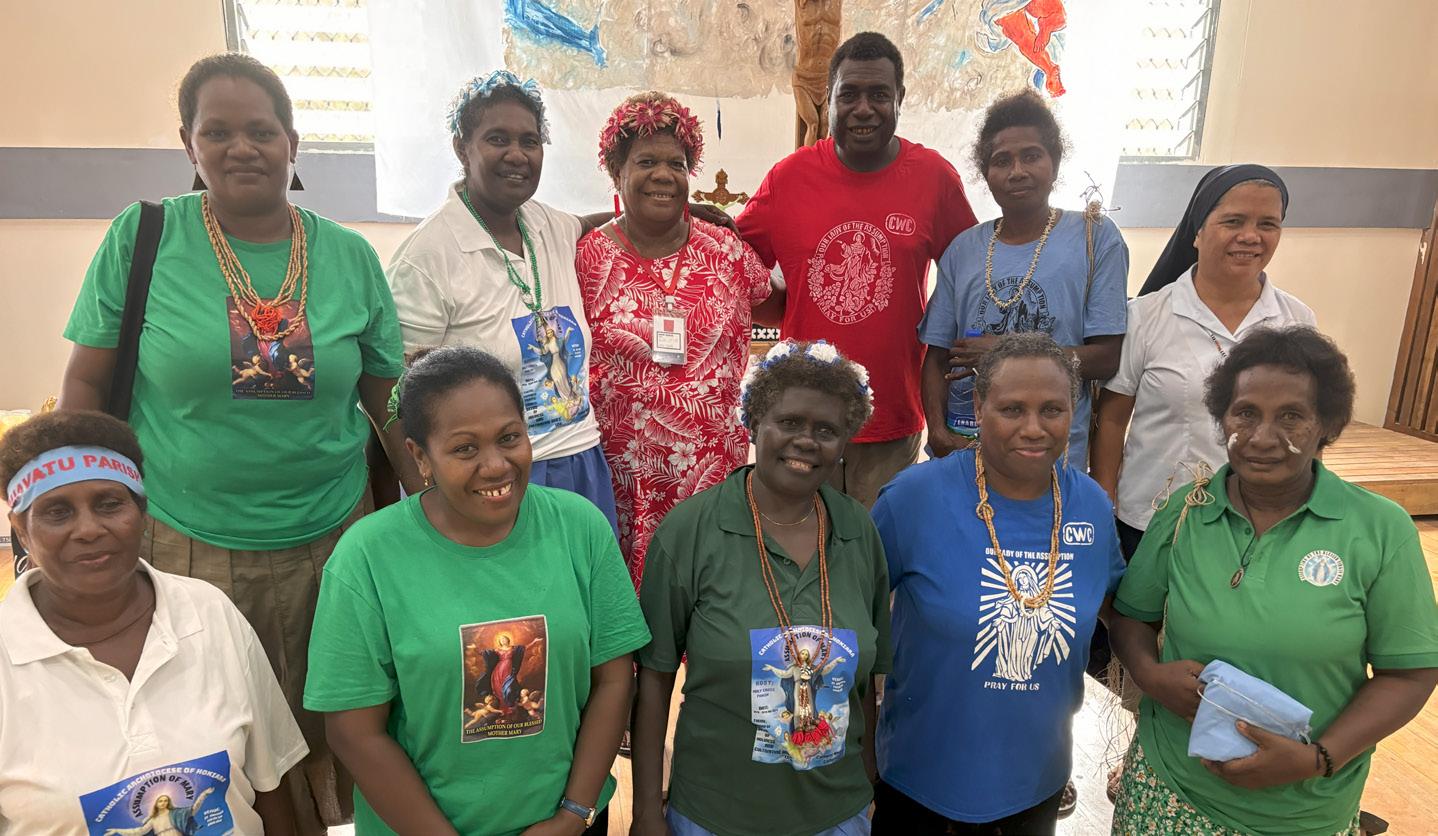

-Student Filistus Wapa
On the 29th of October 2024, a dream became a reality for the Form Three students of Wainoni Marist Secondary School. Dressed in new uniforms, the students walked proudly around the compound, filled with both excitement and anxiety. They eagerly anticipated their long-awaited entry into their new classrooms, while nervously awaiting their exams. After three years, the moment had finally arrived to embrace a dream that had come to life.
“That was the best day I’ve had in my three years at WMSS. For the past three years, we helped build these classrooms, hoping we would one day use them. Today, it felt different — like I was reborn into the WMSS atmosphere. I wish I could be a Form Three student again next year. It felt like taking an exam in heaven. I really enjoyed the breeze, the space, and the brightness of the classrooms,” said Filistus Wapa.
Filistus envies her little sister, who will be using these classrooms for the next few years of her studies (pictured below). Filistus hopes to return and teach at Wainoni so she can once again enjoy these new classrooms and the vibrant atmosphere.


Enjoy some snapshots from our Marist student-led fundraising activities across Australia. Together, our schools have raised more than $100,000! We will be announcing our two 2024 recipients of the AMS trophies in Term 1 2025. The “Highest Fundraising School Trophy” and the “Marist Spirit Award.” These trophies are a great way to recognise the incredible work and dedication of your school and shows the deep appreciation we have for our collaboration. Keep up the amazing efforts!







AMS SCHOOLS CAMPAIGN UPDATE: THANK YOU FROM LAVALLA SCHOOL, CAMBODIA
It has been a busy year for our Marist Schools who have so kindly organised activities throughout the year to raise funds for our AMS Schools Campaign- LaValla Project.
In Cambodia, it is estimated that more than 86,000 children and young people under the age of twenty are living with a physical disability. Unfortunately, those with disabilities are less likely to attend school and more likely to drop out compared to their peers without disabilities, due to the lack of adequate services.
LaValla Primary School stands as the only government-approved institution providing a complete primary education for children with physical disabilities. Most of its students come from rural provinces and reside on-site in supported accommodation. Many of these students are years behind in their education, having been overlooked in their villages and denied access to schooling due to their disability.
The schools campaign has to date raised $100,000 to support LaValla. The amount raised will go toward general maintenance and resources of the school to support the continued growth in student
population. Having a strong connection to our old Marist Brothers Province Australia, current Brothers and staff continue to restore dignity and hope to hundreds of young Cambodians, many of whom have returned to the school as staff as well as countless others who serve as advocates within their communities.



(left) Students undertaking daily classroom activities; (right) The school vehicle has been instrumental in identifying new students, transporting them to and from school, and ensuring they have access to essential health and rehabilitation services. It has also played a crucial role in delivering food and non-food items to students’ families in rural communities, particularly during times of crisis.


Our Communications and Engagement Coordinator, Milika Nation, had the privilege of presenting on behalf of AMS at the Student Leaders Summit in Mount Maria, Mitchelton.
Milika had the chance to meet some incredible students who showed great enthusiasm for the work AMS and its program partners are doing globally.
Students learned about AMS’s mission and vision and got an exclusive preview of the 2025 AMS Schools Campaign, which will focus on St Joseph’s Catholic College Tenaru in the Solomon Islands.
Throughout two engaging workshops, students listened attentively, asked insightful questions, and even shared their immersion experiences from the year, with AMS. It was a wonderful opportunity to inspire and connect with the next generation of leaders.

(this page: Milika Nation presenting to students at the Student Leaders Summit). (opposite page) left, Students at Marist College Kogarah during their 5km walk for AMS and other charities; (top right and bottom) Year 8 students of Cardijn College, Galilee at “City to Bay” fun run and their weekly “Bake Sales.”
INTRODUCING THE FOCUS OF OUR AMS SCHOOLS CAMPAIGN FOR 2025
The focus of our 2025 AMS Schools Campaign is St Joseph’s Tenaru in Solomon Islands. During our MidYear Appeal 2024, AMS was able to raise funds to renovate and refurbish the school’s library.
Now, with your schools’ help, AMS is aiming to support St Joseph’s with general maintenance and resources, providing a better learning environment for its students. Since its inception, the school has seen very few upgrades.
With a rapidly growing student population, the school has more than doubled its capacity in recent years. This expansion has led to overcrowded classrooms, with some students even having to take lessons outside, learning through windows due to lack of space.
In a country with one of the youngest populations in the world, where 70-75% of the population is under the age of 35, it is more crucial than ever to ensure that young people receive the education they need to secure a brighter future for their country. Learn more via this link or enter the following into your browser: https://bit.ly/418GveN


We are excited to invite schools to express their interest in joining our Encounter Program to the Solomon Islands in April 2025. This program offers educators the opportunity to visit our AMS program partners in the Solomon Islands and learn about the vital work they are doing to provide education to young people in local communities, and to scope possible immersion programs for their schools in 2026.
Participants will engage with communities, see first-hand the challenges and successes of education in the region, and gain a deeper understanding of the power of solidarity and cross-cultural exchange. If your school is interested in being part of this transformative experience, please submit your expression at your earliest convenience. You can contact us at: ams@marists.org.au
You can watch the video kindly given to us by Marist College Canberra who recently had their staff immersion program in Solomon Islands August of this year. Canberra Girls Grammar School and Sacred Heart College Adelaide were also part of the staff immersion.
Click the link or enter the following into your browser: https://bit.ly/49aFLYK

This year, our Marist Schools have had the privilege of participating in some incredible immersion experiences, made possible by the dedication of their teachers. At AMS, we are always excited for students to visit our program partners abroad. These visits not only strengthen our relationships but also offer invaluable opportunities for cross-cultural learning and meaningful connection.
Our program partners, including KATILOSA, LaValla Cambodia and Marist Champagnat Institute (MCI) in Fiji, all provide second-chance education to individuals with physical or learning disabilities. The vital work carried out by these organisations play a crucial role in transforming lives, and we are proud to see our relationships with them continue to thrive in different ways, maintaining our Marist Community spirit.
Below are some highlights from 2024 immersions where you can witness our Marist students dancing, playing games, sharing their love of music, teaching in the classrooms and fully immersing themselves in their environments. Enjoy!








Marist Champagnat Institute (MCI), Fiji was warmly welcomed to Sacred Heart College, Adelaide where they shared a 10-day immersion experience fostering a special milestone in the relationship between SHC and MCI.
Activities included attending a range of Marist Mission initiatives. They also had the chance to visit Monarto Zoo, the local beaches and spent their final day at the Royal Adelaide Show.
“We at Marist schools truly cherish the opportunity to participate in immersions and the meaningful connections they foster. It’s especially heart-warming that
our immersion hosts are able to visit us, as for many of them, it’s their very first time overseas. This adds an extra layer of beauty and significance to the experience, making it even more unforgettable for everyone involved.”


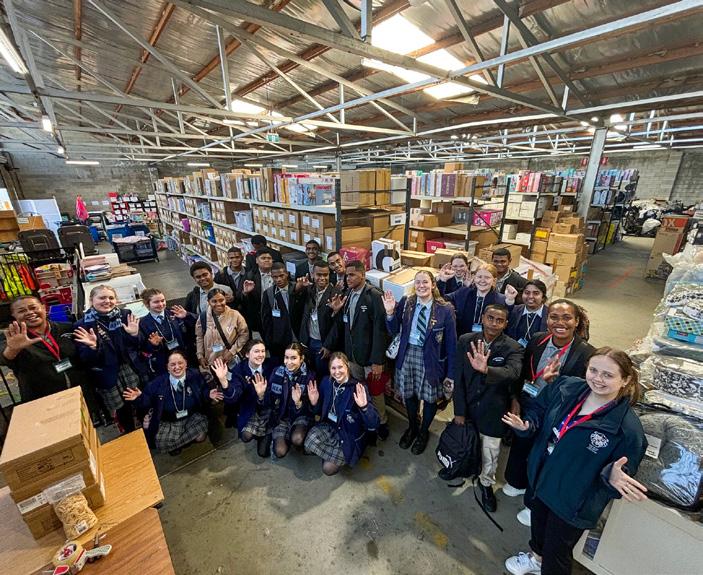

This Fijian Fish Curry, made with the creamy goodness of coconut milk, is the perfect fusion of Fijian and Indo-Fijian flavours, reflecting the rich cultural blend that makes up the heart of the country. The dish beautifully combines fresh fish, aromatic spices, and the smooth, tropical richness of coconut milk.
Pieces of firm white fish are simmered in a spiced coconut mixture for a quick and flavourful meal.
• Prep Time: 10 minutes
•
• Cook Time: 20 minutes
•
• Total Time: 30 minutes
•
• Servings: 4 servings
INGREDIENTS
• 3 tablespoons (44 millilitres) vegetable oil
• 1 medium onion peeled and diced
• 1 cinnamon stick
• 3 cloves garlic peeled and minced
• 2 long red chillies stems and seeds removed, chopped
• 1 1/2 teaspoons garam masala
• 1 teaspoon ground toasted cumin
• 1 teaspoon ground turmeric
• 2 medium tomatoes finely diced

• 1 1/2 pounds (680 grams) firm white fish
• Juice of 1 lemon
• 1 2/3 cups (400 ml) coconut milk
• Salt to taste
• Freshly chopped cilantro for garnish
• Steamed white rice for serving
1. In a large skillet, drizzle the oil over medium heat.
2. Once heated, add the onion and cinnamon stick. Cook until the onion begins to soften, then mix in the garlic and chillies
3. Cook until just fragrant and stir in the garam masala, cumin, and turmeric.
4. Once fragrant, add the tomatoes and cook, stirring occasionally, until the tomatoes start to break down, about 15 minutes.
5. Push in the fish pieces around the tomato mixture to the bottom of the pan and drizzle the lemon juice over the top Cook for a couple of minutes and flip the fish to the other side.
6. Gently mix in the coconut milk and simmer just until the fish is cooked through, about 5 minutes.
7. Season to taste with salt and serve immediately with rice and cilantro.

START YOUR OWN MARIST OLD BOYS FUNDRAISING CAMPAIGN!
Dear Marist Old Boys,
As members of the Marist family, we share a bond forged through our shared experiences, values, and the enduring friendships that continue to shape our lives.
These connections have been an essential part of our journey, and we believe they have the power to make an even greater impact moving forward. That’s why Australian Marist Solidarity is reaching out to invite any Marist Old Boys to start new Marist Old Boys Associations of their own.
Whether you’re reconnecting with old friends or establishing a new chapter, your involvement can help expand our network of support and ensure that we continue to foster the spirit of solidarity, compassion, and service that Marist education has always stood for.
AMS recognises that the friendships and connections among Marist Old Boys are invaluable. We are committed to supporting any Old Boy who wants to establish or grow a local Marist Old Boys Association.
If you are ready to reconnect with the Marist community or take the next step in establishing an Old
Boys Association where you are, we welcome you to reach out to us at ams@marists.org.au
Together, we can continue building a legacy of support and opportunity for those who follow in our footsteps.
We look forward to hearing from you and to strengthening the Marist spirit.

If you would like to have a look at existing Marist Old Boys Associations who are supporting AMS program partners, you can support them by clicking the links/ entering the links provided:
Marist Rosalie Old Boys currently support Rafael Mendonca- a 22 year old from Timor-Leste who is studying to become a primary
school teacher at Instituto Catolico para a Formacao de Professores (ICFP) which are AMS supported, Marist Brothers run teacher training colleges in Timor-Leste.
https://bit.ly/3Z4kECD
MARIST OLD BOYS ASSOCIATION FIJI:
Marist Old Boys Association is currently fundraising to renovate Ratu Mara Hostel in Fiji. This hostel accommodates over 100 boarding students at Marist Brothers High School. Over the years, the hostel has received very little maintenance and yet has had to cope with a growing student population.
https://bit.ly/4fGaXSd
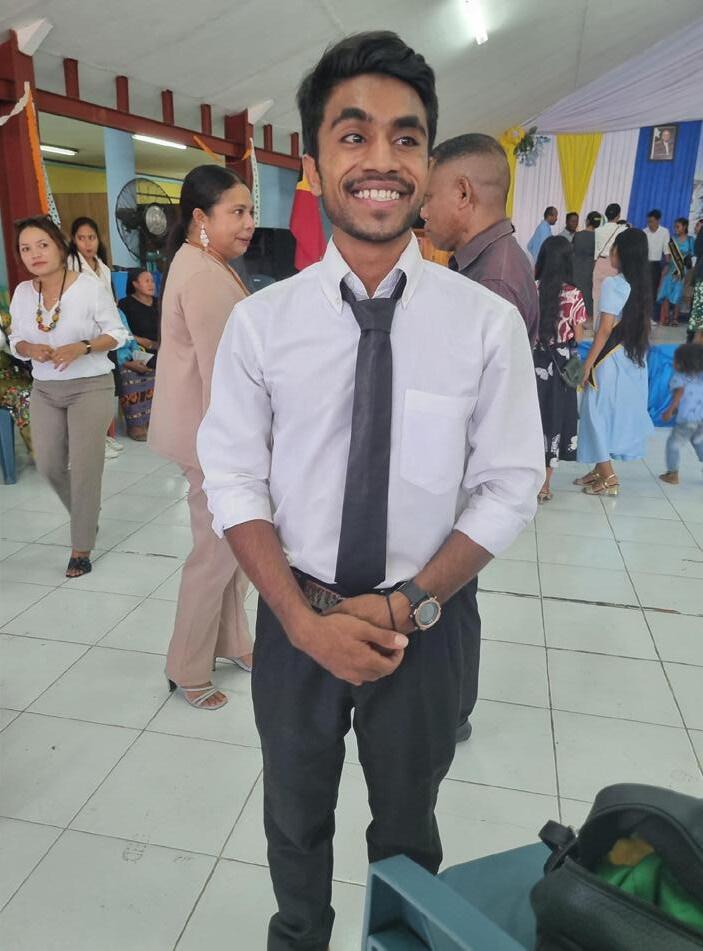

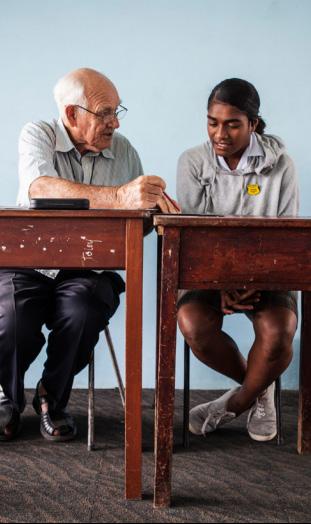
We sincerely thank you for your unwavering commitment to our mission of providing education to young people, empowering them to create brighter futures for themselves. Your generosity has made a profound impact on the lives of those we serve.
In alignment with our shared vision, Julie beautifully expresses the importance of education within our community:
“I believe the Marist community plays a vital role in creating a space where young people feel safe and loved—a place where they can


look outward and make better decisions for themselves and their communities.
When I first heard about AMS projects, I was struck by how small, individual programs can create a ripple effect in local communities, empowering them in meaningful ways. I have great admiration for those who work in these programs; it’s a cause I truly believe in. Personally, I see education as the key to freedom.”
If you would like to learn more about making a bequest or have any questions, please don’t hesitate
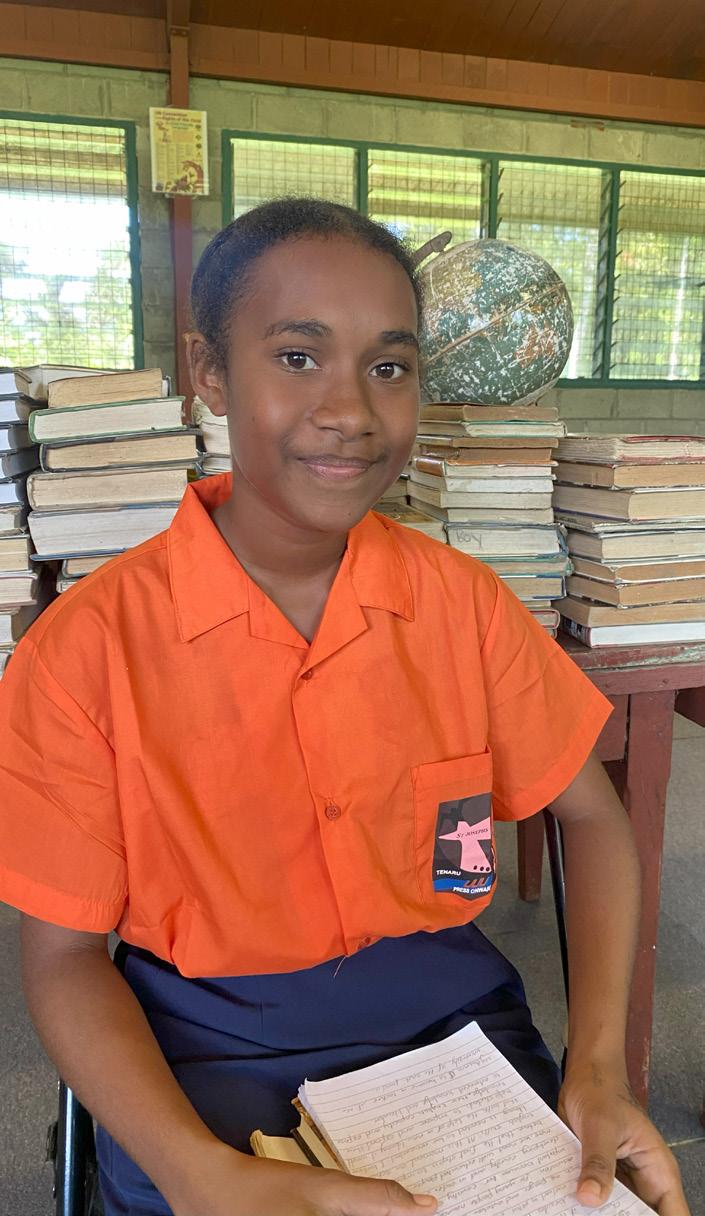
to reach out to us or explore our bequests brochure by entering the link into your browser or by clicking it: https://bit.ly/3VlwJCr
We’re here to guide you through the process and ensure your wishes are honoured.
You can phone us on 07 3354 0600 or email us at: ams.partnerships@marists.org.au
With your support and generosity, together, we bring hope.

HOW DID YOU COME TO BE A BOARD MEMBER OF AMS?
I have a long history with AMS, starting in 2012 as a committee member of Marist Asia Pacific Solidarity. I then joined the AMS Projects Committee, eventually chairing it, before moving to the Finance & Risk Committee, where I also chaired for several years. In 2019, I joined the Board, where I continue to serve today.
WHAT ARE YOU MOST PASSIONATE ABOUT WHEN IT COMES TO AMS?
For those of you who don’t know me, I was born in Fiji and attended Marist schools growing up in Fiji. Therefore, I have a natural affinity or should I say kinship with the people of the Pacific and especially the children who need education opportunities and hope for a brighter future. So, I would be
most passionate about any project that AMS undertakes in the Pacific that provides access to education for children which in turn helps them develop skills and knowledge to enable them to contribute to society and lead a meaningful life.
WHAT HAS BEEN YOUR MOST REWARDING EXPERIENCE AS A BOARD MEMBER?
I would say that my most rewarding experience as a board member is that AMS has broadened my understanding of how we can best help people. We achieve this by working closely with the local communities and listening to what they have to say and not assume that our way is necessarily the best way. We have a team of people who are passionate about AMS’ mission and vision.
IS THE BOARDS VISION FOR 2025?
AMS’ current vision is “a world where young people have hope and the opportunity to access education”. AMS currently has over 50 projects on the go and more in the pipeline. To fulfil this vision, we need the full support of our school community, our donors both here in Australia and overseas and of course our project partners and the local communities we work with. Furthermore, as a board we need to work towards financial sustainability and making the
necessary resources available to help support the team undertake projects to help fulfil this vision.
WHY HAVE THE FIJIAN OLD BOYS CHOSEN RATU MARA HOSTEL AS THEIR FOCUS FOR FUNDRAISING DRIVES?
Many of the Fijian Old Boys or the MOB (Marist Old Boys!!) as we like to call ourselves were boarders at RMH. The cramped living (often 8 boys in a tiny room) together with the hot and humid conditions are forever etched in the minds of every boy who ever boarded at the hostel. Sanitary conditions were atrocious, and the food preparation area was not food safe.
Conditions were so bad that some years ago, workplace health and safety authorities shut down the hostel and ordered remediation works be carried out. Whilst this was being done, many of our boarders had no choice but to go back to their villages or attend other schools. Our MOB community are therefore grateful that they now have the opportunity to help AMS fundraise to undertake improvements to the hostel so that boarders can live more comfortably in the hostel which in turn helps with their studies and extra-curricular activities.

Name (firstname/surname):
Suburb: State: Postcode:
Address:
Email:
Give once: Give Monthly*: *Monthly giving helps AMS and our program partners plan for the future.
I wish to donate: $110 $230 $500 Other:
Credit Card Number:
Expiry Date: / CCV:
Name on Card:
*All donations over $2 are tax deductible. Post: Send this coupon using the reply paid envelop included (no stamp required).
A gift in your will can leave a legacy to transform the education of future generations of young children. Once you have remembered your loved ones, would you please consider leaving a gift in your will?
Tick this box if you would like information about leaving a gift in your will to AMS.
SHARE THE LIGHT OF CHRISTMAS WITH FIJIAN YOUTH AT MARIST CHAMPAGNAT INSTITUTE, FIJI AND HELP TRANSFORM LIVES AT THIS INCLUSIVE SCHOOL, GIVING STUDENTS A SECOND CHANCE.


